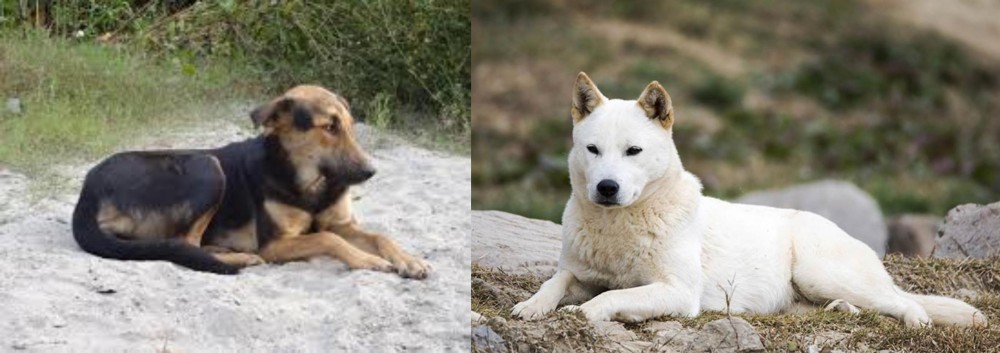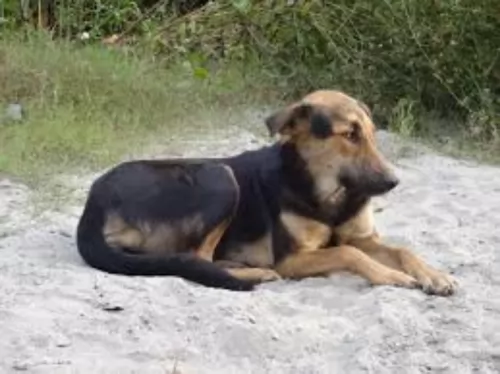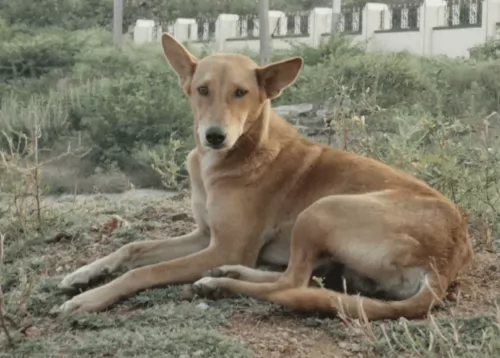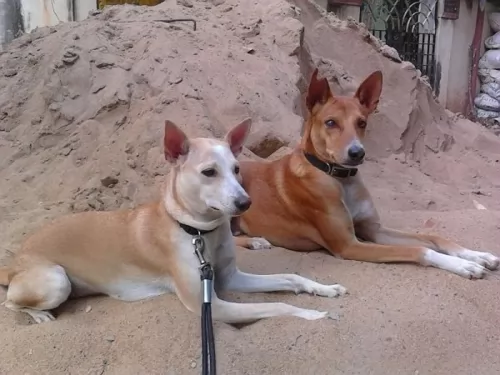 Petzlover
Petzlover Indian Pariah Dog is originated from India but Jindo is originated from South Korea. Both Indian Pariah Dog and Jindo are having almost same height. Indian Pariah Dog may weigh 7 kg / 16 pounds more than Jindo. Both Indian Pariah Dog and Jindo has almost same life span. Both Indian Pariah Dog and Jindo has almost same litter size. Indian Pariah Dog requires Low Maintenance. But Jindo requires Moderate Maintenance
Indian Pariah Dog is originated from India but Jindo is originated from South Korea. Both Indian Pariah Dog and Jindo are having almost same height. Indian Pariah Dog may weigh 7 kg / 16 pounds more than Jindo. Both Indian Pariah Dog and Jindo has almost same life span. Both Indian Pariah Dog and Jindo has almost same litter size. Indian Pariah Dog requires Low Maintenance. But Jindo requires Moderate Maintenance
 The Indian pariah, known also as the Indi-dog or In-dog, is an ancient dog breed common throughout India as well as Bangladesh.
The Indian pariah, known also as the Indi-dog or In-dog, is an ancient dog breed common throughout India as well as Bangladesh.
A breed standard does exist for the dog with the Indian Kennel Club and the dog has also been recognized by the Primitive and Aboriginal Dog Society.
A great dog enthusiast, Indian environmentalist, M Krishnan, has written about this ancient dog breed, telling about its wonderful temperament and its hardy constitution.
 Hailing from Korea, the Jindo dog's name is actually taken from the island Jindo. The dogs lived on the island for thousands of years, developing into a natural breed with good hunting skills.
Hailing from Korea, the Jindo dog's name is actually taken from the island Jindo. The dogs lived on the island for thousands of years, developing into a natural breed with good hunting skills.
They are also known as Jin Dog, Jindo-kae or Jindo-kyon. The exact origins of the Korean Jindo are unknown and it is believed to have been developed from different Mongolian breeds.
They were brought to the United States and been entered into the American Kennel Club.
 The Indian Pariah dog is a medium sized, lanky looking dog with the males and females standing at 46cm to 64cm in height and weighing roughly between 15 to 30kg.
The Indian Pariah dog is a medium sized, lanky looking dog with the males and females standing at 46cm to 64cm in height and weighing roughly between 15 to 30kg.
These dogs aren't big eaters so they tend to be lean and muscular. This is a double coated dog with the hair being coarse and fawn in colour or reddish brown.
He has fairly large, erect ears and brown eyes. He has a long tail which is held down but when he is excited it is held high and over the back, curling at the tip. There is sometimes white around the face and chest.
The Pariah dog is a social dog but he is somewhat timid, even though they make excellent watch dogs, being territorial around their human family. Being territorial, he can have an aggressive side to him so it is wise to have him trained and socialized as then he is obedient and capable of getting on well with children in the home.
These dogs are also very intelligent and therefore easily trained. He is an active dog and likes to be kept busy, wanting to be participating in the activities of his human family.
 The Jindo is a medium sized spitz-type dog breed which is well-proportioned with erect ears and a long tail which is held over the dog's back.
The Jindo is a medium sized spitz-type dog breed which is well-proportioned with erect ears and a long tail which is held over the dog's back.
He stands at roughly 45 – 65cm and they weigh anything between 11 to 23kg. The coat of the dog is medium length and available in a number of colors – yellow, tan, red, white, brindle, black or bi-color such as black and tan.
When you look at the Jindo you get the impression of bright alertness and intelligence. He makes a great watchdog, and with his bright, alert eyes and upright ears, he just looks like he is on guard.
The Jindo has always been a hunting dog so he has learned to be bold, tenacious and alert. He is also brave, courageous, loving and loyal to his master, but you need to know that he is a dominant dog who will get on well with an owner who is fair, strong, patient, kind and firm.
These dogs are strong willed, independent and dominant as well as being intelligent. He will require socialization and training from an early age. Be fair, firm and consistent with your instructions which he will obey once he has been trained. With training he gets on well with children in the home but he is inclined to have some difficulty with accepting other dogs into the family.
As with any dog breed, the temperament of the Jindo will vary according to the environment he lives in and the type of owners he has. The typical Jindo is an affectionate dog with his human family, being a little bit reserved around strangers.
 The Indian Pariah dog is just an ordinary dog looking to be a superb companion for you. These are dogs with no airs and graces and in fact they have lots of positive attributes about them.
The Indian Pariah dog is just an ordinary dog looking to be a superb companion for you. These are dogs with no airs and graces and in fact they have lots of positive attributes about them.
They are just your ordinary, social dogs who are able to form strong, loyal friendships with their human owners. He is a faithful dog breed and he has had a long association with humans dating back to thousands of years. He is healthy and cheerful and he is just waiting for you to give him a chance so that he can show you what a cheerful, playful, devoted, wonderful friend he can be to you too.
 The Jindo makes an awesome pet for owners who enjoy an active lifestyle. A happy, contented Jindo becomes a devoted, loyal pet who wants to guard and protect his owner from strangers, for whom he is wary and reserved.
The Jindo makes an awesome pet for owners who enjoy an active lifestyle. A happy, contented Jindo becomes a devoted, loyal pet who wants to guard and protect his owner from strangers, for whom he is wary and reserved.
He is an intelligent pet too, being easy to train and socialize and while independent, he loves to spend time with his human family and is an all-round excellent pet.
 This is a dog which can live to between 13 and 15 years of age when he is treated well.
This is a dog which can live to between 13 and 15 years of age when he is treated well.
These Indian Pariahs are a natural dog breed, and to this end they are free of genetic health concerns such as hip dysplasia which is a very common ailment with nearly all dogs.
Remember that every dog stands a good chance of picking up some life-threatening illnesses if not vaccinated against them. Some of these diseases to be concerned about are canine distemper and parvo-virus. Rabies, kennel cough and parasites such as fleas and ticks can also pose a real danger to your pet.
The Pariah has been around for a very long time and today he is a robust, low maintenance pet that isn't going to cost you a lot of money .
 The Korean Jindo dog is looked upon as a generally healthy dog breed with no serious genetic problems to talk about. Look out for eye diseases and dental decay as well as hypothyroidism, a common disease in dogs where you notice deterioration with the coat – thinning, dry and dull.
The Korean Jindo dog is looked upon as a generally healthy dog breed with no serious genetic problems to talk about. Look out for eye diseases and dental decay as well as hypothyroidism, a common disease in dogs where you notice deterioration with the coat – thinning, dry and dull.
The dog’s skin also becomes flaky and you’ll notice that your once energetic pet is now gaining weight and is lethargic. Get him to the vet. Hypothyroidism can be treated simply by your vet to get your pet healthy once again.
 This is a low maintenance dog who also happens to shed little. A brush once or twice a week will be sufficient and it will keep the fur shiny and healthy.
This is a low maintenance dog who also happens to shed little. A brush once or twice a week will be sufficient and it will keep the fur shiny and healthy.
Your puppy will need to be vaccinated at 6 weeks of age. There are some veterinary clinics in India that offer free vaccine shots. Your puppy will be dewormed too. Make sure he has a nice dry, warm place to sleep, and for during the day, ensure that there is a shady spot for him too.
It's always a good idea to try and feed your puppy the best food there is. If you visit a veterinary clinic, find out what the most appropriate food would be for your puppy and how often you should feed him during the day.
If you feed your adult Indian Pariah dog kibble and you're able to, try and add in some home-made food too such as cooked chicken or rice. Some raw meat added in from time to time will also do your dog the world of good. Make sure there is always a bowl of cool, clean water standing by.
 The Jindo has a double coat and this sheds heavily about twice a year, so certainly during these shedding periods you will need to brush his coat twice a week to keep it free from loose hair.
The Jindo has a double coat and this sheds heavily about twice a year, so certainly during these shedding periods you will need to brush his coat twice a week to keep it free from loose hair.
Never just assume that your dog is healthy and happy. When you brush him, check him over for ticks and fleas, check him for any unusual lumps, make sure his nose is wet and that his eyes are bright. Look at the condition of his fur, check his teeth and inside his ears – there are lots of tell-tale signs that can indicate that all is not well with your pet and then you need to get him to the vet.
As a medium-sized breed, if you feed your dog commercially manufactured food, he will require a high quality food that has been formulated for a dog of his size and his activity levels. Mix some home-made cooked chicken, brown rice or pasta as well as vegetables into his kibble and try to include some raw meat in occasionally too. He needs to always have access to fresh, clean water.
The Jindo is a high energy dog, and with his bright face you can tell that he is always ready for action. Long ago he was bred to perform hunting and retrieving type jobs, and with their stamina, they require having a busy day.
They certainly require a significant amount of exercise and mental stimulation, so you will need to include him in your daily walks and give him exciting ball games.